- Home
- Ellen Datlow
The Dark Page 16
The Dark Read online
Page 16
For my life at that time was a continual testing. That in ignorance or desperation I would make a terrible blunder, and would not realize my destiny.
Slamming into the car from the car ahead was a girl of about thirty with no eyelashes, no eyebrows like she’d pulled them all out or shaved them as a statement, and she’d shaved her head so these platinum blond quills were growing out, so striking!—everybody in the car stared at her even those who were nodding off woke to take in such a sight. The girl’s face was glowing and shiny as if made of some synthetic material like a flesh-plastic, without pores, and her lips were big and pouty, and her mouth was moving as if she was talking to herself. Seeing me, eyes snatching onto mine, she stopped in mid-stride and stood above me holding the rail about two feet from me, observing me this slow smile breaking over her face like ice melting. A husky girl six feet tall in chinos and tight-fitting black T-shirt with DRAGO FREK in green letters. Her eyes on me were restless as minnows. She leaned down to ask did I know what time it was and I said I didn’t know exactly, it was sometime after 10:00 P.M. I thought. Next she asked didn’t I wear a watch and I shook my head no, she asked was I the kind of girl who didn’t give a shit about the time, I laughed flattered saying I guess I must be. All this while Plastic Girl was leaning over me and her smile was widening and her big chunky plastic teeth were gleaming wetly at me. Plastic Girl said next, You’re a girl who knows her own mind, I guess. That’s fucking cool.
The hairnet woman was really listening to this conversation. Her prissy snail-mouth sucked in upon itself in concentration.
Raising her voice to be heard over the racket of the train Plastic Girl started telling me next about this place she was expected to be, some kind of fucking residence she wasn’t going back to, except somebody there owed her, had some clothes and CDs of hers so she’d have to go back except not by any fucking front entrance she’d be going back through a window and it wouldn’t be fucking broad daylight it would be night. I listened to Plastic Girl’s voice like it was a radio voice. Her actual words were lost to me. I was distracted too by her heavy breasts with no bra, swaying inside the T-shirt, nipples hard as little pebbles. And her belly above the zipper-crotch of the chinos pushing out round and hard like a drum. I was wondering Is this the one? I had a feeling about Plastic Girl … .
At the next station a man pushed into the car, pushed between us like Plastic Girl didn’t exist. Kind of rude behavior I thought but he was smiling sidelong at me like he knew me, or was pretending to know me, this was a game we’d played before. A woman seated beside me decided to move to another seat, uncomfortable with Plastic Girl and this new guy hanging above her, and right away the guy took her place before Plastic Girl could act. You could see Plastic Girl was angry. Baring her teeth like she’d like to tear at somebody with her teeth. I looked up appealing with my eyes, sorry! I was sorry!—but Plastic Girl turned and moved off, took a seat farther down the car that had just opened up. As the train lurched I could see her shaved head glowing like a bulb and her big lips pouting.
The man beside me nudged me asking did I remember him. Huh?
Did I remember him? Dunk’s the name.
Oh God I realized then yes I had met Dunk before. Why I felt sort of familiar with him, sort of protected-by him the way you do with some men, instantly, though not most men, ever. A few weeks before we’d gotten to talking in the subway, and Dunk had taken me for a coffee (at Union Square). Possibly on this exact train. Possibly at this time of evening. Possibly I’d been wearing my patterned stockings, my suede skirt and see-through lace camisole that would’ve been a new purchase then, post-Christmas sale at Strawberry. Possibly Dunk had been wearing the dirt-stiffened jeans and fake buckskin jacket he was wearing now, and his steely-gray hair had been pulled back as it was now in a little pigtail at the nape of his neck. (You had to smile at this pigtail. You knew that Dunk thought it was comical, too. For he was nearly bald. All the hair Dunk had was growing in a narrow band around his head, he’d let grow long to fix into the pigtail.) There was something so old and comfortable about Dunk, like somebody you’d been seeing all your life on TV, this old pothead hippie from long ago you knew you could trust. Dunk said he remembered me, certainly he remembered Rosellen, did I know I’d broken his heart? Dunk made a weepy jocular sound like his heart was broken but mostly he needed to blow his nose which he did in a tissue, now making a honking sound so I laughed. That was Dunk’s power, I recalled: the power to make you laugh. He’d been a psychiatric social worker with the city he said. He’d had to quit after twenty-three years and take disability pay which wasn’t much. In the coffee shop he’d told me of his life lapsing into a monotone. He was one of those individuals who come on strong, make you laugh and intrigue you, then they settle in their usual mode, you discover they are boring though well-intentioned maybe, and kind-hearted as Dunk appeared to be kind-hearted, though his skin exuded heat like a radiator, and it was weird how his right eye kept drifting out of focus while his left eye had me pinned. In the coffee shop Dunk had told me one of his patients had threatened to kill him and he’d said what difference did it make, we are all going to die anyway aren’t we. He’d been so depressed. He was better now but he’d been depressed as hell then. I didn’t know what to say. I drank my coffee in silence. I’d realized by that time that Dunk was not my destiny. I didn’t want to hurt his feelings but there was no mistaking, Dunk was not my destiny. He’d asked would I like to get a bite to eat with him? He was thinking, he said, Chinese.
Thank you, I said, dabbing at my lips with a napkin, but I can’t.
I had not called him Dunk in the coffee shop. I had not wished to send a false signal of intimacy, or the promise of intimacy.
Nor did I say Dunk now. Saying I was sorry, this was my stop, I was meeting somebody and I was late, and goodbye.
WHO is MY destiny? You?
WHOEVER IT WAS, I didn’t see. Never saw his face. Never saw but a shadow in the corner of my eye. A giant bird spreading his wings. (I guess it was a man. Had to be. But even that fact, I can’t be one hundred percent certain of.) It was the 14th Street Station. I’d gotten out, to change trains. My plan was to take the uptown to 57th Street. Past Times Square, I’d been disappointed in Times Square too often lately. I was standing at the edge of the platform just a little apart from the crowd. A few yards maybe. Not far. I didn’t believe that I was standing dangerously close to the edge. Something was on my shoe, something sticky and disgusting like a big wad of gum, I was trying to scrape off my shoe when I saw, or half-saw, the shadow in the corner of my eye, advancing upon me from the left. The thought came to me swift and yearning Please touch me because it was so familiar a thought, never did I believe I was in danger. Touch me even if you hurt me. Oh please.
Then I was falling. I was screaming, anc I was falling. It happened fast. Much faster than I can recall. Though even then I was thinking He touched me, it was a human touch. He chose me because I am beautiful and desirable. He chose me over all others. But already I am on the track. Out of nowhere out of the tunnel the train is speeding. My body is a big boneless rag doll flopping and being crushed by the train. The emergency brakes are thrown on, there’s a deafening shriek as the train stops but it’s too late, it was too late as soon as he pushed me from behind, the palms of both his hands flat against my back between my shoulder blades as if he’d planned the act, he’d rehearsed the act numerous times to perfection. My body is caught up inside the wheels, both my legs severed at the knees, my left arm torn off, my skull crushed as you’d crush a bird’s egg beneath your feet, scarcely noticing you’ve crushed it. On the platform people are screaming. People have stopped dead in the tracks and some of them, mostly women, are screaming. I want to cry, these strangers care for me. In that instant they care for me. The hairnet woman had left the train when I did, maybe she’d followed me, the woman I’d believed had disapproved of me was now crying Help! Get help! Oh God get help! And there’s Plastic Girl running to the edge of the pla
tform like she’s mesmerized, she can’t see me because my body is hidden by the train skidding to a stop, Plastic Girl hasn’t seen where my assailant has gone, where he has run to, she’s stunned as if thinking We could be sisters. That might have been …
And there’s Dunk, slack-mouthed in horror. Dunk with his bald-hippie pigtail gone gray. Dunk stunned and sick with grief he has lost me for the final time.
And others, who never knew me except to glimpse a girl pushed in front of a speeding train to her death, these others grieving for me, too. Never knew me in life but will never never forget me.
PLEASE LOVE ME? my eyes beg. Glancing uneasily at the window beside your seat, the uptown train is flying through the tunnel, or possibly it’s the downtown, lights in the car so bright you can’t see outside, only just your own reflection in the grimy window, your own face, and sometimes you don’t recognize that face.
Please love me? I love you.
AFTERWORD
My favorite ghost story is Henry James’s The Turn of the Screw, a brilliantly enigmatic and endlessly evocative tale of obsession.
STEPHEN GALLAGHER was born in Salford, Lancashire, England, in 1954. After working for a TV company for four years, his frustrations with the limitations of the job spurred him to write, learning the basic craft in radio and then moving into novels and screenplays.
With the sale of his first book, Chimera, he quit his job and headed to the United States with the intention of staying there until the money ran out. He toured extensively and settled for the longest period in Phoenix, Arizona, the setting for his later police procedural/supernatural horror novel Valley of Lights. He moved back to England in 1981 but later returned to the United States to write Red, Red Robin, set in Philadelphia.
Gallagher has written over a dozen novels, sold lots of film options, and written numerous screenplays and teleplays, including an adaptation of Chimera. In 1998 he wrote and directed a miniseries based on his novel Oktober. White Bizango, a short novel, was recently published.
His short stories have been published in Shadows, The Magazine of Fantasy and Science Fiction, Asimov’s SF Magazine, Weird Tales, and in various anthologies.
DOCTOR HOOD
STEPHEN GALLAGHER
AT THE TOP of the narrow garden, Miranda climbed the steps to the front door of her childhood home and rang the bell. Then she waited.
No lights were showing in any of the windows. The lane on which the big house stood was a pocket of old-fashioned stillness in the city, tucked-away behind the cathedral and especially quiet at this hour of the night. You turned in through a gated opening half-hidden from the main road and seemed to enter an older, gentler, and more tranquil world. The lane was narrow and tree-lined. It wasn’t maintained by the city but by the residents, who mostly left it alone.
She gave it a minute before producing her key and letting herself in.
“Dad?”
Now she stood in the hallway, and waited for an answer that didn’t come. She set her overnight bag down on the floor. There was light somewhere upstairs but none down here at all, apart from the watery street lighting that shone in through the windows.
Miranda started to ascend, calling to her father as she went.
There was apprehension in her, but she wouldn’t acknowledge it. She’d come here to establish that nothing was wrong. Not to flirt with dread. Dread’s day would come regardless, she’d learned. Why spoil other days by anticipating it?
The next floor was also dark. The light came from the one above, where her old room had been. She stood on the landing and looked up the stairs.
“Dad?”
Something moved in the darkness behind her.
She spun around. In the space of an instant, she felt her heart rate spike and a cold shockwave pass through her. It seemed to take the breath from her body while lifting every fine hair on her skin.
“God Almighty,” Alan Hood said, no less taken aback.
He was a pale and insubstantial shape in the darkness, but as he moved forward into the light, she could see him better. He had some sort of technical device in his hand that he glanced at and then shoved into his pocket.
“Where did you appear from?” he said. “You frightened the life out of me.”
“I let myself in,” Miranda said. “What was I supposed to do? You didn’t answer when I rang the bell, and that was after I’d been trying all night to phone.”
“Well, why not just call me tomorrow?”
“Well, why do you think?”
It came out a little more stridently than she’d intended, but it gave him an accurate snapshot of her mood. What could he expect? That she shouldn’t worry? Her father lived alone in this enormous empty house, and she lived a hundred miles away.
He ran a hand through his uncombed hair and glanced all around him, in an attitude that was somewhere between distraction and embarrassment.
“I suppose I can see what you mean,” he said, and then, “Why don’t we go downstairs?”
She couldn’t help looking at him critically as he moved past her. His clothes were clean, but didn’t match and looked as if they’d been slept in. He was turned out the way a man might dress for gardening.
As she followed him down, the thought in her head was both an uninvited and an unwelcome one. He’s doing his best, but he’s looking old.
He apologised for the state of the kitchen, as well he might.
“I’m due a tidy up,” he explained.
Miranda looked through towers of pans and dishes at the phone extension on the wall. This was the message phone. No wonder there’d been no answer when she’d called.
“Why’s it unplugged?” she said.
Her father had to move some of the dirty stuff in the sink just to get the kettle underneath the tap.
“I was working on something,” he told her as it filled. “I needed to concentrate.”
If he’d disconnected the bedroom phones as well, her attempts to raise him must have rung out unheard in the basement.
There were no clean mugs, but he rinsed a couple and set them on the kitchen table. As he was pulling out a chair, she said to him, “Your head of department called me. He got my number from your doctor. He wanted to talk about something.”
He looked at her in puzzlement as he sat. “What, exactly?”
“He didn’t say. Just left me a message.”
“And you couldn’t leave it until the morning?”
“No.”
“You didn’t have to race over. Everything’s fine.”
“It doesn’t look it,” she said, and waited.
He looked around and past her, anywhere but at her. He clearly didn’t have a ready or an easy answer to her concern.
“I don’t know how to say this,” he said. “Which is why I haven’t tried. But since you’ve come all this way and you’re obviously worried, I’d better tell you. I’ve been aware of your mother.”
“That’s no surprise,” she said. “There can’t be a thing in this house that doesn’t remind you of her.”
“More than that.”
His gaze was on her and steady now, and she didn’t like the way it was making her feel.
“What are you saying?”
“It’s a perception thing,” he said. “You want the science of it? There’s no obvious cause but there can be a definite physical effect. The temperature falls. The electromagnetic potential at a given point changes. I can measure it. I’m not about to start believing in ghosts,” he added quickly. “But maybe this is what makes people fall for the idea.”
“Ghosts? Jesus, Dead …”
“That’s exactly my point.”
“So being you, of course you’ve got to study it.”
“I can’t dismiss any of it, can I?” he said. “It’s firsthand experience. The alternative is to pretend it didn’t happen. How professional would that be?”
What she really wanted was for him to stop right there, to change the subject, or even better, to te
ll her that he wasn’t really being serious.
Anything that meant she wouldn’t have to deal with this.
She said, “What form does the awareness take?”
“Mental certainty,” he said. “For no apparent reason. Nothing seen, nothing heard, I just know she’s there. While I fully accept that she isn’t.”
“All the time?”
“No.”
“Okay. Right.”
There was an awkward silence.
“So how’s everything at your end?” he said.
PAUSING ON THE way to collect some bedding from the half-landing cupboard, Miranda trudged up the stairs that had once been so familiar to her. Most of her childhood and all of her teenaged years had been spent in this house. She’d never imagined there could be a day when it wouldn’t feel like home. But the day had come nonetheless.
The suite of attic rooms had been her exclusive territory. The Independent Republic of Miranda. They’d redecorated the one room she’d painted black, but otherwise they’d left everything pretty much as it was. Now she saw cables on the upper landing and boxes in some of the rooms. They were like the boxes that computers came in.
So what was the purpose of all this? When she elbowed open the door to her old bedroom, a sudden flash half-blinded her and she almost dropped the linen right there.
On a tripod in the middle of the room, a Polaroid camera spat out a print.
“Oh, for fuck’s sake!” she said, and when she’d tossed the linen onto the bed, she lifted the entire apparatus, tripod and all, and shoved it out onto the landing. There were microphones in the corners of the room, and they followed the camera along with their cables.
Lying in her old bed, in her underpants because she’d forgotten to bring nightwear, too exhausted to stay awake, too upset to go to sleep, her mind wandered a little and then settled into its well-worn small-hours track. The one she never chose, but couldn’t avoid.

 Inferno
Inferno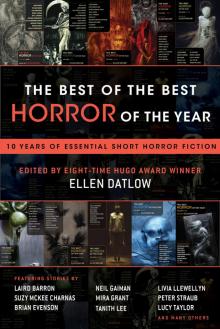 The Best of the Best Horror of the Year
The Best of the Best Horror of the Year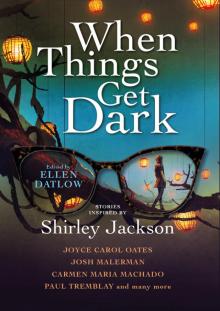 When Things Get Dark
When Things Get Dark A Whisper of Blood
A Whisper of Blood Echoes
Echoes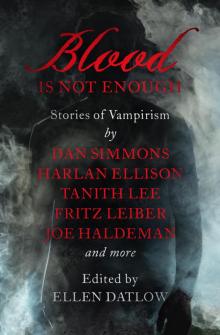 Blood Is Not Enough
Blood Is Not Enough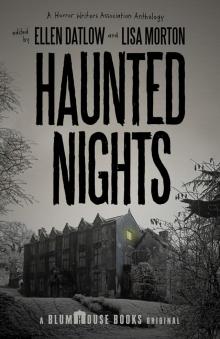 Haunted Nights
Haunted Nights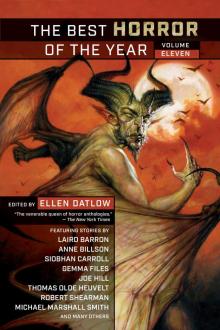 The Best Horror of the Year Volume Eleven
The Best Horror of the Year Volume Eleven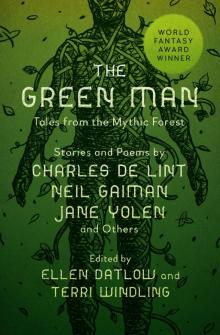 The Green Man
The Green Man The Dark
The Dark Mad Hatters and March Hares
Mad Hatters and March Hares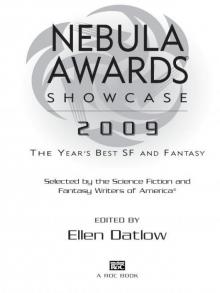 Nebula Awards Showcase 2009
Nebula Awards Showcase 2009 The Devil and the Deep
The Devil and the Deep